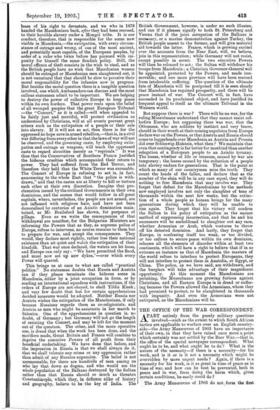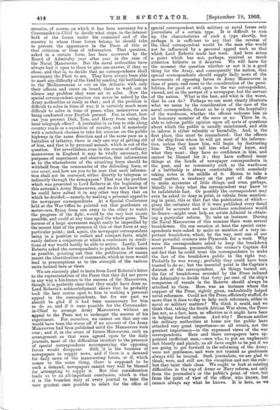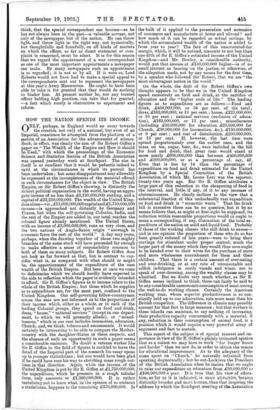THE OFFICE OF THE WAR CORRESPONDENT.
APART entirely from the purely military questions involved—such as the extent to which South African tactics are applicable to warfare over an English country- side—the Army Manceuvres of 1903 have an importance of their own, in that they have raised. once more a point which certainly was not settled. by the Boer War,—that is, the office of the special newspaper correspondent. What ought he to be, and what ought he to do ? What is the nature of the necessity—if there is a necessity—for his work, and is it or is it not a necessity whicli might be overridden by more urgent needs ? Again, if there is a necessity for his work, is it as great in time of peace as in time of war, and. how can he best be prevented, both in peace and in War, from doing the harm which, given certain conditions, he easily could do ?
The Army. Manceuvres of 1903 .do not form the first
. •
occasion, of course, on which it has been necessary for a Commander-in-Chief to decide what steps, in the interest both of the forces under his command and of the country to whom those forces belong, he should take to prevent the appearance in the Press of this or that criticism or item of information. That question, asked in a certain form, has been answered by the Board. of Admiralty year after year in the case of the Naval Manceuvres. But the naval authorities have always had it open to them to give one answer, if they so chose, and that is, to decide that no correspondents shall accompany the Fleet to sea. They have always been able to meet any difficulty of the kind by sending the battleships to the Mediterranean or out on the Atlantic with only their officers and crews on board, there to work out in silence any problem they were set to solve. Now the special correspondent question can never be solved by the Army authorities as easily as that ; and if the 'problem is difficult to solve in time of war, it is certainly much more difficult to solve in time of peace, when manoeuvres are being conducted over English ground. For, in short, how can you prevent Dick, Tom, and Harry from using the local telegraph office? A journalist is as free to ride along country roads as a squadron of cavalry, and if Somebody with a notebook chooses to take his exercise on the public highway in the same direction and at the same pace as a battalion of infantry, there is only one way of getting rid of him, and that is by personal assault, which is out of the question. Yet nevertheless, even in the course of ordinary manoeuvres in England it may be vitally necessary, for purposes of experiment and observation, that information as to the whereabouts of the attacking force should be withheld from the commander of the defending force, or vice versa, and how are you to be sure that such informa- tion shall not be conveyed, either directly by telegram or indirectly through the newspapers ? That was the problem which was presented to Lord Roberts at the beginning of this autumn's Army Manceuvres, and we do not know that he could have solved it in any other way than that on which he decided,—namely, by making a personal appeal to the newspaper correspondents. At a Special Conference held at the War Office he pointed out that gentlemen on motor-cars, flying from one army to the other to watch the progress of the fight, would be the very best scouts possible, and could at any time spoil the whole game. The success of a large movement might easily be imperilled by the merest hint of the presence of this or that force at any particular point ; and, again, the newspaper correspondent being in a position to collect and compare facts, might easily deduce a conjecture at which a combatant in condi- tions of war would hardly be able to arrive. Lastly,' Lord Roberts asked the correspondents to publish as few names as possible, pointing out that the publication of names meant the identification of commands, which in turn would lead to presumptions as to the strength of the various units located here or there.
We are sincerely glad to learn from Lord Roberts's letter to the representatives of the Press that they did not prove in any way a hindrance to the success of the Manceuvres, though it is perfectly clear that they might have done so. Lord Roberts's acknowledgment shows that he probably took the best course open to him in making a personal appeal to the correspondents, but for our part we should be glad if it had been unnecessary for him to do so, and if it were possible for the Commander- in-Chief to arrange Army Manoeuvres without an appeal to the Press not to endanger the success of his experiment. For ourselves, we cannot see that any one would have been the worse off if no account of the Army Manceuvres had been published until the Manoeuvres were over; and if, in the event of future Manceuvres, such an arrangement as that were agreed upon by the daily journals, most of the difficulties incident to the presence of special correspondents accompanying the opposing forces would disappear. Still,. it is the business of newspapers to supply news, and if there, is a demand for daily news of the manoeuvring forces, or if, which comes to the same thing, there is supposed to be such a demand, newspapers cannot very well be blamed for attempting to supply it. But that consideration leads' us to an all-important conclusion, which. is that it is the bounden duty of every journal to take the very greatest care possible to select for the office of special correspondent with military or naval forces only journalists of a certain type. It is difficult to sum up the characteristics of such a type shortly, but perhaps it is sufficient to say that the reverse of the ideal correspondent would be the man who would not be influenced by a personal appeal such as that which Lord Roberts made last week. And here arises a point which has not, perhaps, received as much attention hitherto as it deserves. We will leave for the moment the question whether or not it is a good thing for the Army, and consequently the nation, that special correspondents should supply daily news of the movements of opposing forces in Army Manceuvres in time of peace, and come to the consideration of the possi- bilities, for good or evil, open to the war correspondent, viewed, not as the servant of a newspaper, but the servant of the nation. What is the best, and what is the worst, that he can do ? Perhaps we can most clearly illustrate what we mean by the consideration of the case of the naval correspondent, thrust as he is upon the hospitality of the wardroom, whether the officers welcome him as an honorary member of the mess or no. There he is, able to inform public opinion upon all sorts of questions about which the public is usually uninformed, and able to inform it either valuably or harmfully. And, in the first place, this must be remembered : that the officers of the ship from 'whom he will get most of his informa- tion, unless they know him, will begin by distrusting him. They will not tell him what they know, and what they want ; they have no confidence in him, and cannot be. blamed for it ; they have suffered many things at the hands of newspaper correspondents in the past, and no community such as the wardroom of a battleship is always comfortable with somebody taking notes in the middle of it. Hence, to take a small matter, a tendency on the part of the officer to make mysteries of little things, and even, perhaps, blandly to deny what the correspondent may know to be indubitable fact.. Or possibly the correspondent may even be asked to deny in print, or refrain from mention- ing in print, this or that fact the publication of which— given the certainty that if it were published every detail would be accurate and no invidious conclusions would be drawn—might even help an astute Admiral in obtain- ing reform. To take an instance. During the Naval Manceuvres of this summer there were several breakdowns. On one' occasion at least the special corre- spondents were asked to make no mention of a very im- portant breakdown, which, by the way, sent one of our most powerful cruisers into Plymouth for a week. Why were the correspondents asked to keep the breakdown secret ? Because, presumably, the cruiser's Captain did not feel that he could trust the 'correspondents to make the fact of the breakdown public in the right way. Probably he was wrong; probably they could have been trusted to do so ; but the essential point is the Captain's distrust of the correspondent. As things turned out, the list of breakdowns recorded by the Press induced the Admiralty to decide that forty per cent. of the ship's companies of vessels in the Reserve should always be attached to them. Here was an instance where the support of the Press, rightly given, undoubtedly helped naval reformers. Could not the Press, efficiently staffed, do more than it does to-clay to help such reformers, either in naval or military' matters ? We think it could, and we think that, taking the South African War alone, the Press has not, as a fact, been as effective as it might have been in helping forward reform. And why ? Because neither the military authorities at home nor the public have attached very great importance—at all events, not the greatest importance—to the expressed views of the war correspondents. Here and there newspapers have ap- pointed inefficient men,—men who, to put an unpleasant fact bluntly and plainly, as all facts ought to be put if we are going to get forward in the reforming of the Army, were not gentlemen, and were not trusted as gentlemen always will be trusted. Such journalists, we are glad to think, were, and still are, the exception and not the rule ; but they taint their class. We ought to look at existing difficulties in the way of Army or Navy reform, not only from the journalist's or the public's point of view, but from the point of view of the officer, who knows, but cannot always say what he knows. It is here, as we think, that the , special correspondent can become—as he has not always been in the past—a valuable servant, not only of the newspaper, but of the nation. He can throw light, and throw light in the right way, not hysterically, but thoughtfully and forcefully, on all kinds of matters on which the officer, so far as direct statemant or com- plaint is concerned, must be silent. It is for this reason that we regard the appointment of a war correspondent as one of the most important appointments a newspaper can make. By many newspapers such an appointment is so regarded ; it is not so by all. If it were so, Lord Roberts would not have had to make a special appeal to the correspondents sent out to represent the newspapers at this year's Army M_anteuvres. He ought to have been able to take it for granted that they would do nothing to hinder him. At present neither he, nor any trusted officer holding high position, can take that for granted, —a fact which surely is obstructive to experiment and reform.








































 Previous page
Previous page